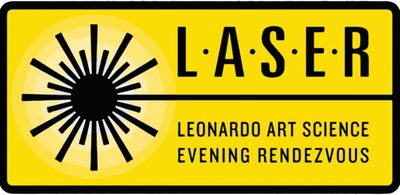Leonardo LASER talks Linz 2025
5. September 2025, 10.00 bis 12.00 Uhr Kunstuniversität Linz - Hauptplatz 6, 5.OG, Glashörsaal
Lab Songs Vol. II - Mycelium Labs
Leonardo LASER Linz im Rahmen der Teilnahme von Interface Cultures am Ars Electronica Festival 2025
Scientific and artistic breakthroughs arise not only from discoveries but also from transformations in practices, methodologies, and systems of evaluation. Once defined by rigor and controlled experimentation, laboratories are now reimagined across disciplines as spaces where different forms of knowledge production (aesthetic, technological, ecological, theoretical) come into proximity, often under conditions of friction, ambiguity, or indeterminacy.
This Leonardo LASER Talk event convenes artists and scientists working with mycelium and other living matter to present their research and open a dialogue on intersecting goals, infrastructural needs, shared and diverging agendas. Together, we will explore these laboratories as heterotopic spaces, capable of generating new collective practices and futures.
Participants:
Sarah Kolb (AT) - Department of Art History and Art Theory/Kunstuniversität Linz
Magdalena Breitwieser (AT) - Soft Matter Physics/Institute of Experimental Physics/JKU
Jitka Effenberger (AT) - Soft Matter Physics/Institute of Experimental Physics/JKU
Julia Moser (AT) - Department Design & Technology/Crafting Futures Lab/Kunstuniversität Linz
Noor Stenfert Kroese (NL) - Creative Robotics/Kunstuniversität Linz
Fabricio Lamoncha (ES) - Interface Cultures/Kunstuniversität Linz (host)
ROUNDTABLE / PANEL
Presentation of the Co.Lab Mycelial Space / Sarah Kolb as part of the Leonardo LASER Talks
Sarah Kolb is an art theorist, philosopher, and curator based in Vienna and Linz. She is a founding member of the interdisciplinary network Mycelial Space and of Viktoria – Space for Artistic Research and Social Design in Vienna. As an FWF Elise Richter Senior Fellow at the University of Arts Linz, she is currently working on the research project Topologies of Artistic Research. Relational Knowledge in Art and Theory. Before she was Visiting Professor of 20th Century Art History at the University of Salzburg, university assistant at the University of Arts Linz, lecturer at the Academy of Fine Arts Vienna, and curator at the Vienna Secession. Publications include Logik des Imaginären. Diagonale Wissenschaft nach Roger Caillois, 2 volumes Berlin 2028/2024 (ed. with Anne von der Heiden); "Making Kin with/through Fungi. Collaborative Learning in Entangled Environments," The Journal of Aesthetic Education 59/2, eds. Eva Cronquist and Anja Kraus, University of Illinois Press (Summer 2025), 96–115, doi.org/10.5406/15437809.59.2.07; Ästhetik der Transformation. Bildtopologie nach Henri Bergson und Marcel Duchamp, Bielefeld 2025 (forthcoming).
Jitka Effenberger works as technician at the department of Soft Matter Physics at the Johannes Kepler University Linz, researching and investigating on myceliumbased materials in interdisciplinary teams (projects: Myco-Insulation, MycoSoft). She is teaching and organizing collaborative mycelium material workshops and lectures in multiple departments at the University of Arts Linz and other institutions. Technical consulting in several artistic projects. Architecture student at BASEhabitat, University of Arts Linz, with focus on sustainable ecological building materials, working on her MA thesis on circular biobased mycelium materials in architecture. Beside the scientific and material-technical approach on mycomaterials, Jitka Effenberger is focusing fungi from an aesthetic point of view, experimenting with mycelial patterns, colours, structures etc. in artistic works. Jitka Effenberger is board member of Collaborative Building & Living, Vienna.
Magdalena Breitwieser is a PhD candidate in the department of Soft Matter Physics at the Johannes Kepler University Linz, Austria. Her current research focuses on the material properties of Ganoderma lucidum mycelium skins, with the aim of developing a chemical treatment to enable their use as substrates in sustainable electronics. With this, she intends to fabricate biodegradable optoelectronic devices for display and energy harvesting technologies. Her prior research includes reducing the energy footprint of perovskite crystal formation by utilizing UV light to influence their crystallization dynamics, as well as investigating 2D/3D heterostructures in perovskite solar cells.
Julia Moser is a textile and fashion designer and founder of Growing Patterns, Living Pigments. With her work focusing on biodesign, bacterial dyeing, and sustainable innovation in textile and fashion practices, she is engaged in research and teaching at the University of Arts Linz (mainly affiliated to the Crafting Futures Lab). Her practice explores alternative design approaches through material innovation and new technologies, aiming to reshape the future of making towards greater sustainability and care. Her work has been presented in international exhibitions and fairs, including the V&A London, Design Museum Holon, National Art Center Tokyo, and Première Vision Paris.
Noor Stenfert Kroese is a new media artist and researcher with a background in performance art, scenography, and mycology. She explores biomediated interactions between humans, living organisms, and robotics through media art and performative installations. She combines her artistic practice with her PhD research at the Creative Robotics Lab. She works as a lecturer at the University of Arts Linz and a University Assistant in the Master’s program Art & Science at the University of Applied Arts Vienna (dieAngewandte). Her research focuses on data storytelling of living organisms, fungi-inspired biocomputing and (non)-human interactions with industrial robotics. She develops sensor-based methods and living materials within bio arts and biofabrication, to explore and research meaningful interactions between humans, non-human organisms, and technology.
Fabricio Lamoncha is an artist and researcher from Spain, based in Austria. After graduating with a PhD in 2024 from the University of Art and Design Linz with the dissertation titled “Interspecies Interstitial Interfaces: Why Do I Care for Indoor Plants but Let the Rucola Rot in the Fridge?”, Fabricio is currently Senior Artist at the Interface Cultures Master’s program, where he teaches, conducts research, and cares for the laboratory spaces. He is member of the Art|Sci Center at UCLA and co-founder of the Leonardo Laser Talks Linz. His research explores the entanglements of media ecology and bioethics. His practice has been exhibited internationally and awarded with the Art and Artificial Life International Award Vida14.
Moderatoren der Leonardo LASER-Veranstaltungen in Linz: Fabricio Lamoncha und Christa Sommerer
leonardo.info/laser-talks
www.lasertalks.com
Link to Leonardo event here.
